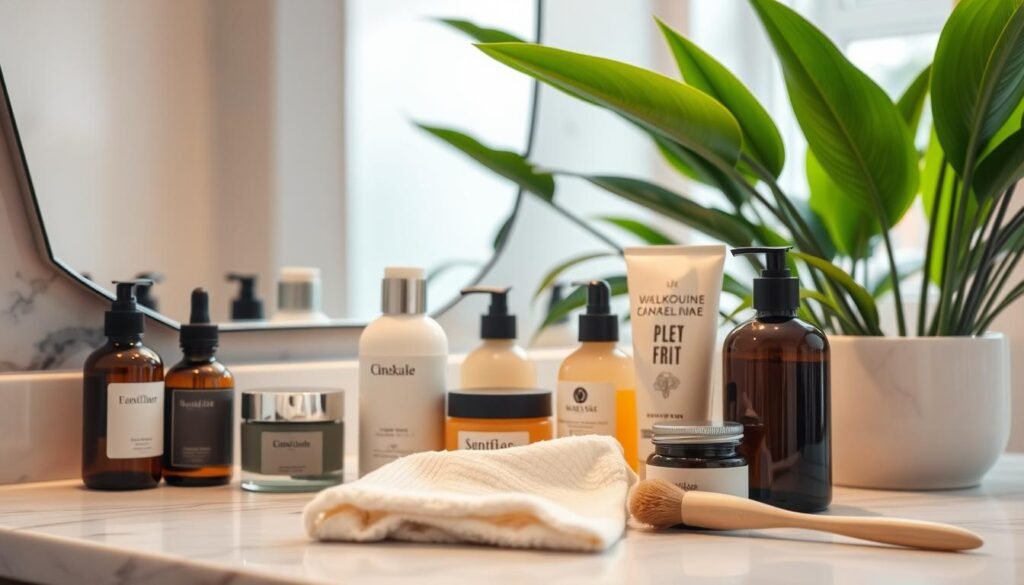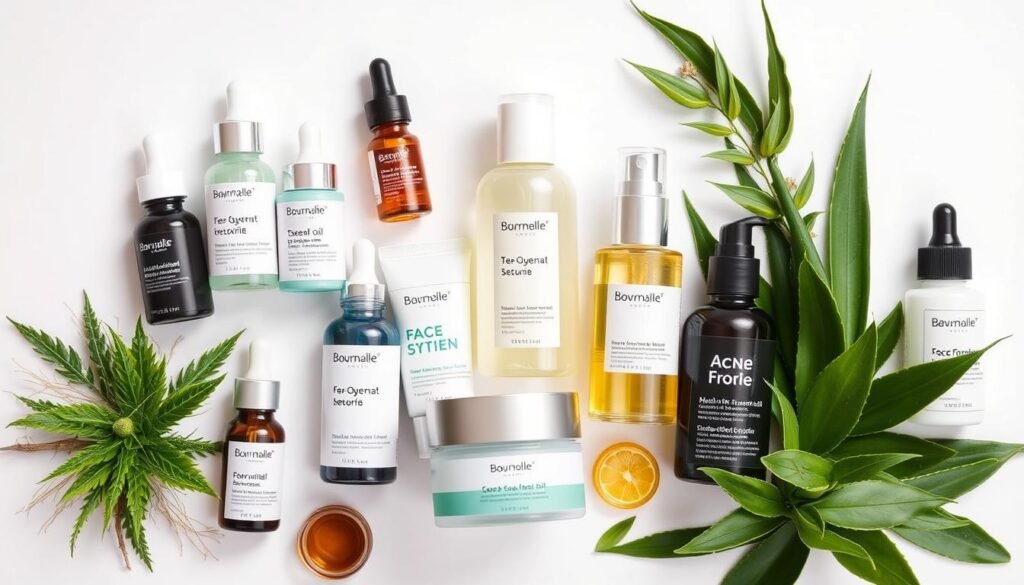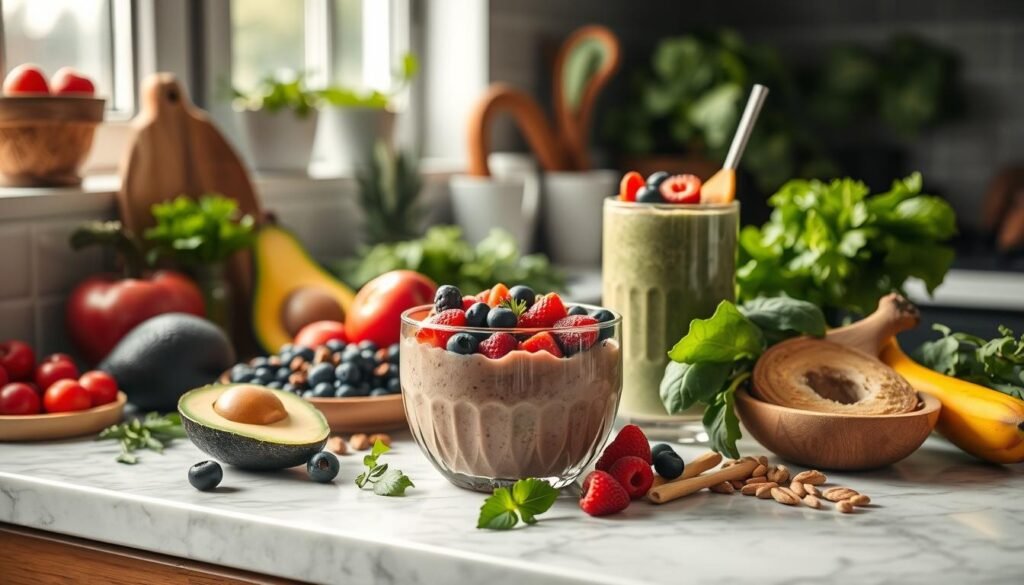Did you know that 85% of people will get acne at some point? This skin issue doesn’t just hit teenagers; adults struggle too. Feeling good about our skin is important for everyone. Learning how to avoid pimples is key to maintaining a clear face. With easy prevention tips and the right treatments, managing your skin can be simpler. Making small changes to your daily routine helps fight off blemishes and boosts your confidence.
Key Takeaways
- Drink plenty of water to help balance skin oil and reduce pimples.
- Incorporate spot treatments like hydrocolloid patches for effective healing.
- Use warm compresses and clay masks to ease pimples and draw out impurities.
- Opt for noncomedogenic moisturizers to prevent skin dryness and irritation.
- Understand the impact of stress and hormonal changes on acne breakouts.
- Utilize over-the-counter products containing benzoyl peroxide or salicylic acid for maximum effectiveness.
Understanding Acne and Its Causes
Acne is a skin issue that affects around 60 million people in the U.S. every year. It happens when oil glands in the skin get inflamed. This causes blocked pores and pimples. Knowing what causes acne is key for better skin health.
Many things lead to acne formation. Hormonal changes are a big factor. They happen during puberty, menstruation, and pregnancy. These changes can make your skin produce more oil. This often leads to acne. Women might notice more acne before their periods. Some people are more likely to get acne because of their genes.
Things like pollution and stress can make acne worse. Certain meds might also increase acne. Also, clothing or sports gear can put pressure on your skin. This pressure can cause acne.
Understanding acne’s many causes helps in preventing and treating it. Handling these causes well can make your skin clearer. It also boosts your confidence.
| Factor | Details |
|---|---|
| Hormonal Changes | Increases oil production, especially in teenagers and women. |
| Genetics | Family history influences susceptibility to acne. |
| Environmental Factors | Pollution and stress worsen skin conditions. |
| Medications | Corticosteroids and certain hormones can exacerbate acne. |
| Friction/Pressure | Clothing and equipment can induce breakouts on the skin. |
How to Stop a Pimple from Forming
To prevent pimples, knowing what causes them is key. By identifying acne triggers, you can choose better skincare and lifestyle habits. This reduces your chances of getting breakouts.
Identifying Triggers
What you eat affects your skin a lot. Animal protein, chocolate, and fast food can cause more pimples. Stress also plays a big role; it can make hormonal acne worse. Be careful with your skincare too. Washing too much can harm your skin and lead to more oil and pimples.
The Role of Hormones
Hormonal acne often affects adults, especially women during certain times like menstruation, pregnancy, or menopause. Understanding this can help prevent pimples. Tracking hormone changes is smart. It lets you adjust your skincare and treatments on time. Eating well and managing stress also helps keep your skin clear.
https://www.youtube.com/watch?v=ys_R4KZYj24
If you’re looking for more tips or treatments, check out Pandia Health. They have great advice on dealing with acne.
Essential Steps for Pimple Prevention
For clear skin, it’s important to know and follow key steps daily. A regular skin cleaning routine helps stop new pimples. It’s crucial for removing dirt and getting your skin ready for more care, especially if you have acne-prone skin.
Daily Skin Cleansing Routine
Clean your skin twice a day as part of your daily routine. Choose a soft, non-blocking cleanser to wash away oil, dirt, and dead skin. This helps keep your skin’s moisture right and stops pores from getting blocked, which might cause pimples.
To make your cleansing routine work better, try these tips:
- Use lukewarm water to open pores while cleansing.
- Gently massage the cleanser into the skin for at least 30 seconds.
- Rinse well and pat dry to remove all residue.

Importance of Moisturizers
Even for oily skin, adding a moisturizer to your routine is key. The right moisturizer keeps your skin hydrated without making more oil that can lead to pimples. Look for “oil-free” or “non-comedogenic” on labels to make sure they won’t block pores. Moisturizers help balance your skin’s moisture and lessen the chance of outbreaks.
Here’s a quick guide to different moisturizers:
| Type of Moisturizer | Best For | Key Features |
|---|---|---|
| Gel-Based Moisturizers | Oily Skin | Lightweight, oil-free, absorbs quickly |
| Cream Moisturizers | Dry/Sensitive Skin | Rich, hydrating, thicker consistency |
| Lotion Moisturizers | Combination Skin | Medium texture, hydrates without greasiness |
To learn more about tailored skincare, click on this link. Following a good cleansing routine and using the right moisturizers are fundamental. They prevent pimples and promote healthier skin.
Choosing the Right Acne Products
Finding the best acne treatment is vital for clear skin. Different ingredients help in different ways. It’s key to know which ones suit your skin type. Ingredients like benzoyl peroxide and salicylic acid are important for treating breakouts.
Key Ingredients to Look For
Benzoyl peroxide fights acne by killing bacteria and lowering swelling. Studies show low doses, like 2.5%, work just as well as stronger ones. Mixing benzoyl peroxide with retinoids, for instance, adapalene, can boost the effects.
Salicylic acid, a beta hydroxy acid, helps keep pores unclogged. You can find it in strengths from 0.5% to 2% without a prescription. Azelaic acid, at 10%, targets dark spots and keeps pores open.

Over-the-Counter Solutions
Differin gel and similar products provide easy treatments without a doctor’s note. These are good for beginners in skincare. Results may take 2 to 3 months of regular use to show.
If acne stays, mixing different active ingredients might help. Start with weaker products to avoid irritation. If acne persists after a few months, see a healthcare provider. For tips on fighting blackheads and keeping skin clear, visit this resource.
| Ingredient | Type | Benefits |
|---|---|---|
| Benzoyl Peroxide | Antibacterial | Kills bacteria, reduces clogged pores, inflammation |
| Salicylic Acid | Beta Hydroxy Acid | Exfoliates, keeps pores clear |
| Adapalene | Topical Retinoid | Reduces inflammation, normalizes skin cell turnover |
| Azelaic Acid | Topical | Prevents plugged pores, brightens post-acne dark spots |
Dietary Considerations for Clear Skin
What you eat matters for your skin, especially when it comes to acne. Certain foods can make acne worse or better. Making smart food choices can help clear up acne symptoms.
Foods to Avoid
Your diet and acne are linked. Foods that spike your blood sugar can make acne worse. This happens because they can increase insulin resistance. When insulin spikes, it causes more sebum production, leading to acne. Foods to watch out for include:
- White bread and pastries
- Sugary snacks and cereals
- Processed foods
- High-fat dairy products
High-glycemic diets are linked to more acne. One study showed that people with severe acne ate more high-glycemic foods. Also, women drinking lots of skim milk had more acne.
Incorporating Healthy Options
On the other hand, better food choices can lead to clearer skin. Choose foods with a low glycemic index to keep your blood sugar steady. Include foods high in omega-3s to reduce inflammation linked to acne. Good food options include:
- Berries and leafy greens
- Whole grains like quinoa and brown rice
- Lean protein, like chicken and legumes
- Nuts and seeds full of healthy fats
Eating the right foods can make a big difference for your skin. Avoid bad foods and choose good ones to reduce acne. For more tips on how to change your diet to fight acne, check out this anti-acne diet link.

Managing Stress to Prevent Breakouts
Handling stress is key but often missed in acne prevention plans. A major study shows stress makes acne worse for many. About 50% to 80% of people see their skin react badly to stress. It leads to more hormones like cortisol, making more oil and potentially more acne.
The link between acne and stress is quite complicated. Stress makes skin problems worse by causing more sebum, swelling, and hormonal shifts. This means stress can both cause and worsen acne.
To fight this, there are good ways to reduce stress for clear skin. Doing things like exercising, meditating, and eating and sleeping well helps lower stress. Some good habits include:
- Eating lots of fruits and veggies.
- Cutting down on too much caffeine and alcohol.
- Getting into a good sleep schedule for better rest.
- Trying out relaxation techniques after busy days.
It also helps to seek expert advice on dealing with stress. Mental health experts can offer specific ways to manage stress, aiding in reducing acne caused by stress.
Best Skin Care Practices to Follow
Good skincare is key to preventing and treating acne. It helps improve how we look and reduce breakouts. Knowing how to choose and use cosmetics wisely avoids skin problems. This leads to clearer and healthier skin.
How to Use Makeup Wisely
Pick non-comedogenic and oil-free makeup to avoid clogging pores. For acne-prone skin, light formulas are best. Use them carefully. Keeping makeup tools clean and not touching your face are also important. Always take off makeup before sleeping with a gentle cleanser, such as Neutrogena Ultra Daily Face Wash for Sensitive Skin. This keeps your skin clear of oil and dirt.
Avoiding Common Pitfalls
It’s important to avoid mistakes if you have acne. Exfoliating too much can remove natural oils, making skin problems worse. Heavy makeup should be avoided. Also, not knowing about skincare ingredients can cause issues. Learn about active ingredients like salicylic acid, benzoyl peroxide, and adapalene. This helps in choosing the right treatments. Use a daily moisturizer with sunscreen to control oil and prevent sun damage.
When to Seek Professional Help
Seeing a dermatologist can greatly improve how you deal with tough or lasting acne. It unlocks access to professional acne treatment not found in regular products. If you often have breakouts, or if your skin doesn’t get better with daily care, think about getting expert help.
Consulting a Dermatologist
Getting advice from a dermatologist is key for ongoing skin problems. They do more than treat acne; they learn about your skin type and its needs. A chat can pinpoint what’s making your acne worse, such as hormones, the environment, or food. This way, you get advice on what treatments will work best for you.
Prescription Options for Severe Acne
When store-bought products don’t cut it, doctors might suggest prescriptions. These can be creams to open pores or antibiotics to fight bacteria. For tougher cases, isotretinoin is an option. Because it’s strong, doctors watch its use closely, especially in pregnant women due to risks. Some birth control pills can also help with acne tied to hormone changes.
Learning about these severe acne treatments shows the value of expert advice. It assures you that you’re not alone in tackling skin issues.
Conclusion
Understanding how acne works is key to stopping pimples. A summary on pimple prevention shows that you can achieve clear skin. This requires daily care routines that involve cleaning with warm water and using the right acne products.
Changing what you eat is also important for your skin’s health. Our skin’s condition reflects our lifestyle choices and habits. So, it’s not just about using skincare products.
Keeping stress low and taking care of yourself are important for controlling acne long-term. Since acne can affect how we feel about ourselves, thinking positively about our skin matters. To keep your skin clear, be patient and know that it might take weeks to see results.
Getting advice from a dermatologist is a good idea if store-bought products don’t work. They can offer treatments suited just for you.
Clear skin comes from a mix of good skincare, eating right, and handling stress well. By following these tips for clear skin, you can feel more confident and keep your skin healthy. Getting rid of pimples takes dedication, but the results are worth it in the end.